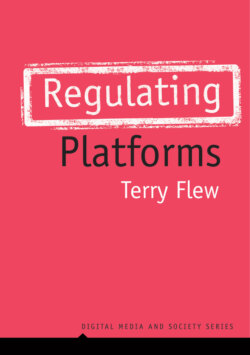Читать книгу Regulating Platforms - Terry Flew - Страница 19
The Open Internet and Romanticism
ОглавлениеThe internet reshaped debates about freedom in particular ways. The internet was quickly embraced in the 1990s as a conduit for free minds and free markets (Barbrook and Cameron, 1996), the ‘American dream’ (Dyson et al., 1994), and Jeffersonian democracy (Barlow, 1996a). It appeared to open possibilities for what Mark Poster called a ‘second media age’: a qualitative break from the industrial-era one-way communication in broadcast mode, and a new orientation towards two-way modes of communication, through ‘a decentralised network of communication [that] makes senders receiver, producers consumers [and] rulers ruled, upsetting the logic of understanding of the first media age’ (Poster, 1994). This is sometimes known as ‘spontensous ordering’, a concept most developed in the work of Friedrich von Hayek and associated with Austrian economics (Méra and Hülsmann, 2017). Adam Curtis’s (2011) documentary gives an illustrative example of this in practice. At a 1991 ‘happening’ in San Francisco, a computer engineer from California called Loren Carpenter organized a mass experiment in which hundreds of people were given a paddle with a red dot on one side and a green dot on the other. On a big screen in front of them was projected the then popular computer game Pong, where a ball is knocked back and forth on a screen, as in table tennis. Members in each half of the audience jointly controlled the bat on their side of the screen and had to operate it together. Spontaneously and without discussion, they played a game of Pong successfully, cheering at this collective but not organized collaboration.
A new, decentralized communication network, with the opportunities it offered, required the absence of state regulation, particularly over online speech. An early proponent of this argument was Ithiel de Sola Pool, who identified the potential for electronic communications to evolve into a new ‘technology of freedom’ (de Sola Pool, 1983). For this potential to be realized, de Sola Pool saw it as imperative that the new technologies be not regulated and that policymakers shift decisively away from the regulation of content and speech that had come to characterize broadcast media. This was not simply a matter of pragmatics – decentralized networks are inherently more difficult to regulate than centralized ones – but a fundamental philosophical choice. For de Sola Pool, the new networks or electronic communications required a ‘policy of freedom’ and ‘freedom from government’:
The phrase ‘communications policy’ rings oddly in a discussion of freedom from government. But freedom is also a policy. The question it poses is how to reduce the public control of communications in an electronic era. A policy of freedom aims at pluralism of expression rather than at dissemination of preferred ideas. (De Sola Pool, 1983, p. 8)
Such a ‘policy of freedom’ would be enabled by the perceived plasticity of the medium itself. Unlike broadcast technologies, digital media were seen as being fundamentally shaped by their user communities. The internet pioneer Vinton Cerf argued that ‘the Internet can be anything we can imagine and program it to be. It is a most malleable and evolving infrastructure … With such plasticity, it is how we think about the Internet that matters … The Internet evolves in response to forces acting on it’ (Cerf, 1996, p. ix).
This should not be taken as a sign that internet theorists were necessarily conservative or neoliberal. While some authors were clearly in favour of the free market (Rossetto, 1996), others saw the internet’s roots in anti-market movements associated with the New Left in the 1960s. For example, Mark Poster connected the ‘second media age’ of the internet to postmodernism (Poster, 1994), while Howard Rheingold (1994) envisaged a new communitarianism and a revitalization of the public sphere around digital culture.
Tom Streeter (2011) has argued that internet culture has long been strongly imbued with an ethos of romanticism, which can have both capitalist and anticapitalist variants. Capitalist romanticism may be found in the continuing influence of authors such Ayn Rand, the ‘free minds and free markets’ ideology often promulgated in Silicon Valley, and the enduring appeal of the charismatic outsider who challenges the establishment with a new vision. Think of the appeal of Steve Jobs in challenging the dominance of IBM in the 1980s, of the image of a geeky, t-shirt-wearing Mark Zuckerberg taking on the ‘suits’ in films such as The Social Network, or of Elon Musk promoting cryptocurrencies as disruptors of traditional finance. Even when parodied, as in HBO’s comedy Silicon Valley, Silicon Valley preserves its underlying iconography of a hacker culture. But an anticapitalist romanticism, or at least one that is deeply ambivalent about capitalism, has also been prevalent and its ethos is recognizable in movements such as the open source software movement. This movement claims that collaboratively developed software is superior to proprietary forms, as well as in a long-standing hostility to copyright and intellectual property laws, which create ‘information enclosures’ and barriers to social sharing and collaboration (Vaidhyanathan, 2001). Streeter argues that one of the legacies of romanticism is the expectation that the internet should be open and disruptive by its very nature. Streeter also argues for the importance of such ideas, which exist in a complex but relatively autonomous relationship with dominant corporate interests and institutional forms, in the ongoing shaping of digital environments:
One of the most powerful forces maintaining the Internet’s open, anarchic character, in sum, is our memory of all the romantic stories about the Internet; those stories taught us to expect the Internet to be liberating and unpredictable, and that expectation helps keep it that way. The Internet is open, not because of the technology itself or some uniquely democratic potential hidden inside the technology, but because we have narrated it as open and, as a consequence, have embraced and constructed it as open. (Streeter, 2011, p. 175)
